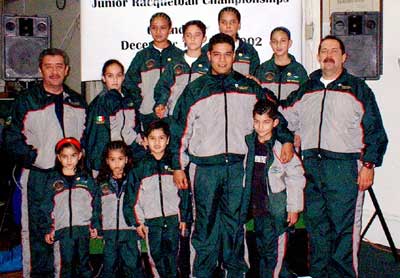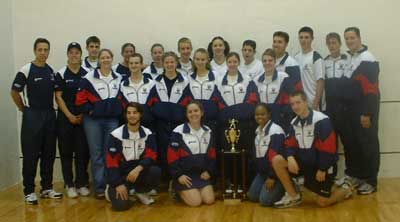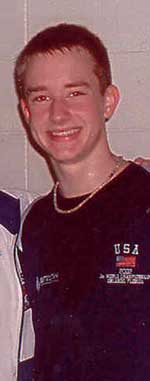
March - April 2003
Vol. 14, No. 2 | Contents
by Ryan John
Mexico had been primed for this leap for quite some time -- after having placed second in nine out of the ten years that team records have been kept [since 1992].
 Going into the tournament the U.S. knew that the rest of the world was catching up with them on the court and this would be their toughest test to date.
Going into the tournament the U.S. knew that the rest of the world was catching up with them on the court and this would be their toughest test to date.
“The U.S. team should be pushed to their limit,” USRA Executive Director Jim Hiser commented before the tournament. IRF President Keith Calkins agreed with Hiser and added, “Although the U.S. Team has never lost the Junior World title, the parity that has developed throughout the world should result in a very close competition.”
Standing out for Mexico was Paola Longoria and Ruben Estrada, who each left Orlando with three gold medals in hand. They both won their respective 12- singles and 14- doubles, then teamed up to take the 12- mixed doubles title. Also shining for Mexico were Alejandro Cardona,
Augustin Tristan, and David Ortega with two gold medals apiece. Ortega has yet to lose a world junior championship match.
However, it wasn’t just a few key players that helped Mexico to its first world title, but an aggressively-recruited, solid team of juniors from 6- all the way to 18-. Going into the final two days of competition, Mexico found itself in a favorable position by often having two, and sometimes three players, in the semifinals, making it nearly impossible for the U.S. to overcome an early point
deficit ... [excerpt]
by U.S. Junior Team Head Coach, Kelley Beane
There is something about a great team that just draws you in; whether it’s pure talent, or a tight group that truly cares about one another. In the case of this year’s
U.S. Junior Racquetball Team it was both.
I think one of the most important elements of a great team is the people that it is made up of, the players, the coaches and of course the parents. These people don’t have to be superstars, but they need to want to be.
When I first started to see this team form in Chicago (at junior nationals) last year it was bittersweet. I saw some great matches and exceptional play by just about everyone. The problem is that I have worked with many of these kids either at Alabama’s “Rumble” or on past U.S. Junior Teams, and they can’t all be on the team. I knew once the semis had been played that we were really going to have something special this year, you could see it. With eleven new kids making the team, I wanted to make sure I met with all of the parents and team members before leaving Chicago. I wanted to let them know what we as coaches expected from them, and in turn wanted to know what the athletes expected of us. That set the groundwork for our U.S. Team camp in Colorado Springs, Colorado in August.
Typically at training camp we divide our days by training physically on the courts, then at night we try, with the help of the captains, to build our “team.” I can honestly say that for the first time that I can remember this team never had to be “built.” Each evening we all got together to discuss the day’s events, go over our training and then talk about subjects that will remain sacred to only this team. There was lots of laughter and lots of tears. No fronts. No attitudes. Just sincerity. Respect for each other and the coaches. When these kids spoke of friends, parents, and people important to them, it came from the heart. Heart is what it takes to be a champion.
 Arriving at Worlds, we kept to the same schedule as training camp, and we had team meetings each night. Again, sincere and personal. We talked about what we were up against.
Arriving at Worlds, we kept to the same schedule as training camp, and we had team meetings each night. Again, sincere and personal. We talked about what we were up against.
Captains Jack Huzcek and Adrienne Fisher led great team meetings and inspired us all. I’ve since learned that we were not picked to win the Worlds, and I’m glad no one dared to mention that earlier.
These kids went on to the court and brought everything they had. They played with integrity, desire and courage.
Dan Sheppick, re-playing match point = integrity. Ben Croft, cramping so badly, up 7-2 in the tiebreaker = courage. Desire = everyone. As a coach I could not possibly ask for anything more from these athletes. It is an honor to be associated with this team and I am very proud of each and every one of them. We will bounce back, we already have. The e-mails we send almost daily are still flowing. The training schedules are being tweaked and we have made a new plan for next year. The
other coaches, Cheryl Gudinas, Mitt Layton and Shane Wood are constantly working to improve our plan for next year.
The parents this year were so supportive and have given us great ideas, we will put them to use again. The Junior Council is meeting to help us with fundraising so that we can see the kids for more than four days a year to train. I look forward to seeing what the next year will bring.
In closing, this junior team can hold their heads up high knowing that they “dared to be themselves in the face of adversity. That they chose right over wrong, ethics over convenience, and truth over popularity. They traveled the path of integrity without looking back.” That’s what makes a championship team, in my opinion.
Team Photo: Courtesy Mark Chirban
 Some readers may remember Ruben Gonzalez’s legendary skip call on himself against Marty Hogan in the finals of a 1985 pro-stop. Hogan was up 10-8 against Gonzalez in the tiebreaker when Gonzalez hit an apparent winner down the line to force a side out. The referee called the shot good, Hogan appealed and both line judges agreed with the call. There was only one problem — Gonzalez didn’t step into the service box to start the next rally. Instead he stood hunched over at center court with his hands on his hips and a small smile on his face. He then shook hands with Hogan congratulating him on his win. Gonzalez called the skip on himself and gave away his first real shot at winning a pro tournament.
Some readers may remember Ruben Gonzalez’s legendary skip call on himself against Marty Hogan in the finals of a 1985 pro-stop. Hogan was up 10-8 against Gonzalez in the tiebreaker when Gonzalez hit an apparent winner down the line to force a side out. The referee called the shot good, Hogan appealed and both line judges agreed with the call. There was only one problem — Gonzalez didn’t step into the service box to start the next rally. Instead he stood hunched over at center court with his hands on his hips and a small smile on his face. He then shook hands with Hogan congratulating him on his win. Gonzalez called the skip on himself and gave away his first real shot at winning a pro tournament.Fast-forward to 2002 and the Junior World Championships, where USA’s Dan Sheppick was leading Mexico’s Gilberto De Los Rios one game to none and serving for the match at 14-14. After a long rally Sheppick hit a shot to end it, which the referee called good. De Los Rios appealed to the line judges who agreed with the referee. Match over except for one problem ... Sheppick wasn’t sure.
“The shot looked good but it sounded funny,” he said. “I looked outside of the court at my teammates and half of them said it was good and the other half couldn’t tell. I lost a match when I was younger on a bad call and I told myself then that I would never win that way.”
Sheppick decided to play the point over and lost serve on the next rally. After a few more side outs he ended up losing the second game 15-14 and subsequently lost the tiebreaker 11-10, but he didn’t end up losing his honor. “I ended up losing but I felt better about it because I didn’t have to cheat to win.”
“I’m so proud of him,” said U.S. Junior Head Coach Kelly Beane. “To feel so strongly not to want to win on a questionable call says a lot about his character.”
Everyone knows that Gonzalez went on to win many pro tournaments, national titles, world championships, plus was inducted into the Hall of Fame just a few years ago. If Sheppick can continue to follow a similar path he’ll have a long and successful career in racquetball. But even if he doesn’t, he can look back with pride. He did follow perhaps the most honorable steps that a player has ever taken on the court.
“I picked Shane and Mitt to help round out our coaching staff,” explained Head Coach Kelly Beane. “I knew Shane had coached at the collegiate level [Nichols College] and had played and won at the junior level. He was younger and might be more in touch with the kids than the rest of us. I had watched Mitt play and I really liked his style of play and the way that he handled himself on the court.” [Layton holds over a dozen age group titles, and won the Bud Muehleisen Athlete of the Year Award in 1997].
Both Shane and Mitt knew that they had a tough challenge ahead, but perhaps didn’t know how emotionally involved they would become or how rewarding the experience would be. “I played it (junior worlds) a number of years and I never got that emotional when I played,” Shane said. “When you’re coaching it’s like you are playing within that kid.”
“I was excited. I’m an emotional person anyway,” agreed Mitt. “It is the first time I have ever witnessed a junior worlds. With all of the chanting and cheering it reminded me of a Davis Cup”
They also agreed that the challenge is something that they welcome and not anything they wish to give up. “I’ve enjoyed this past year in racquetball more than any other year and I have played for 23 years,” stated Mitt. “I have never been so mentally exhausted after a tournament, but I wish it was still going on.”
“I want to do it (coach) until the USRA tells me I can’t,” Shane agreed. “It is by far one of the best weeks I’ve ever had in racquetball.”

Coaches pictured L-R: Layton, Gudinas, Beane, Wood.
Photo courtesy Kelley Beane.
Top | RacquetballMagazine.com | USRA.org
© United States Racquetball Association -- All Rights Reserved